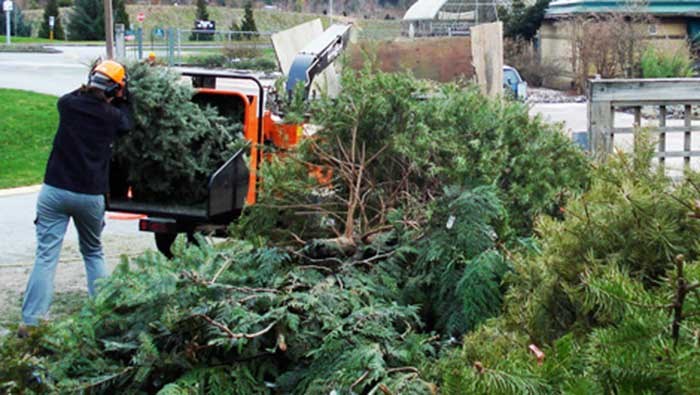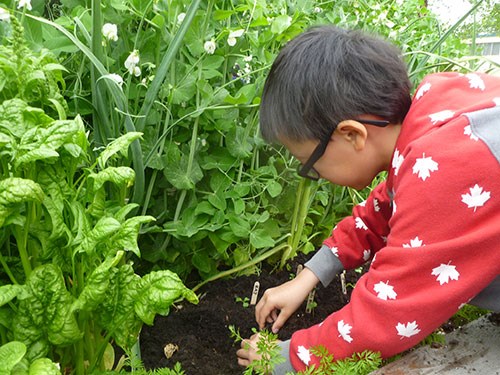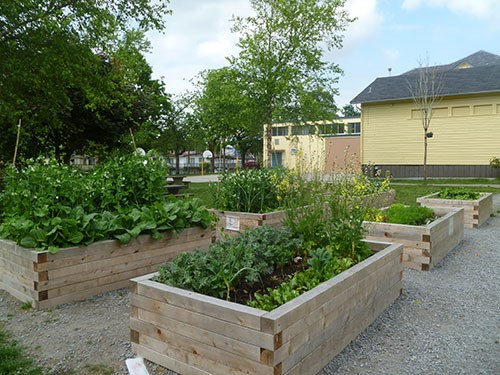By Matias Taylor
Christmas is right around the corner, and with it, endless firs, pines, spruces, and other trees have been turned into bright and beautiful decoration hangers all across Vancouver. But what happens when the Christmas music dies down, the Christmas dinner leftovers are gone, and it's time to put the tree away?
UBC Botanical Garden is holding its annual from December 26 2016 to January 8 2017. Members of the public are encouraged to bring their trees (bereft of adornments, including tinsel, and without yard trimmings, since they may contain invasive plants that can harm the Garden) and contribute a $5 or more suggested donation. Proceeds will go towards The Society Promoting Environmental Conservation (SPEC)'s School Garden Program, which, since its inception in 2008, helps create community garden infrastructure and food and garden-related educational opportunities for students across Vancouver.
 Trees are recycled at UBC Botanical Garden.
Trees are recycled at UBC Botanical Garden.
This year, SPEC is partnering with ten different schools, delivering garden and food-related lessons to 1500 students across Vancouver, and proceeds from UBC Botanical Garden's tree chipping will specifically go towards John Norquay Elementary School in East Vancouver. SPEC School Gardens Program Coordinator Nikoo Boroumand credits "active and engaged parent volunteers, enthusiastic teachers, a supportive principal, and students that care for and maintain the garden on a regular basis" as reasons for continuing the partnership, which built and installed a garden shed for the food garden last year. This year, SPEC will expand the Norquay garden's watering capabilities and implement water conservation strategies. The proceeds will also fund garden and food-related lessons at Norquay, including lessons on seeds, winter gardening, and pollinators.
 A student at John Norquay Elementary School taking part in the program.
A student at John Norquay Elementary School taking part in the program.
Food gardening has been linked to mental health improvements and a greater understanding of nature, and Nikoo has seen first-hand how transformative the activity can be for young minds. "In my three years running the SPEC School Gardens Program, I have seen how engaging kids in gardening can change how they treat each other and the planet for the rest of their lives. When kids learn how to care for a plant, a worm, or an insect, their level of compassion for other beings increases. They are able to empathize with other beings, and realize how important their role is in taking care of other beings. This fall, during a compost lesson, a student in grade 3 came to me while gently holding a worm in the palm of her hands and said, “I'm usually scared of worms.”"
 John Norquay Elementary School’s SPEC-sponsored community garden.
John Norquay Elementary School’s SPEC-sponsored community garden.
Nikoo also credits the program with expanding kids' palates ("Last Spring, while I was guiding a grade 4 class in tasting leafy greens in the Norquay school garden, a student said to me, “This is the only time I eat vegetables.”") and successfully educating about the importance of composting ("they watch their food scraps turn into delicious and nutritious food for the garden"). He sums up SPEC's philosophy when it comes to the program with "the concept of showing them, rather than telling them", arguing that "food and gardening is a beautiful way to engage kids in understanding how nature works."
In addition to supporting SPEC, UBC Botanical Garden's tree recycling will also create sustainable materials to line trails and paths within the garden, as the recycled trees are turned into mulch.


